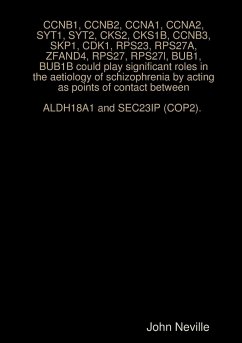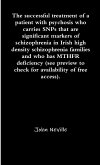Fourteen genes and their paralogues (CCNB1, CCNB2, CCNA1, CCNA2, SYT1, SYT2, CKS2, CKS1b, CCNB3, RPS23, RPS27A, ZFAND4, RPS27, RPS27l, BUB1, BUB1B, SKP1, CDK1), which putatively act as points of contact between ALDH18A1 and COP2 associated genes, particularly SEC23IP and CSNK1D, are identified which could play significant roles in the aetiology of schizophrenia. Many of these genes are found at the same genetic locations as deletion/duplication disorders and/or CNVs that have been reported on as being associated with schizophrenia. A partial failure of SEC23IP binding is identified as a possible cause of symptoms of 22q Parkinson's disease. Proline residues are identified as possible treatment targets in 22q Parkinson's disease.
Bitte wählen Sie Ihr Anliegen aus.
Rechnungen
Retourenschein anfordern
Bestellstatus
Storno









